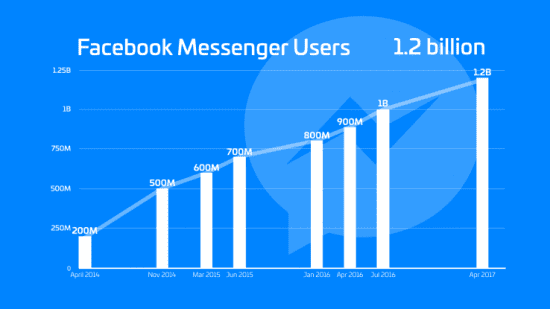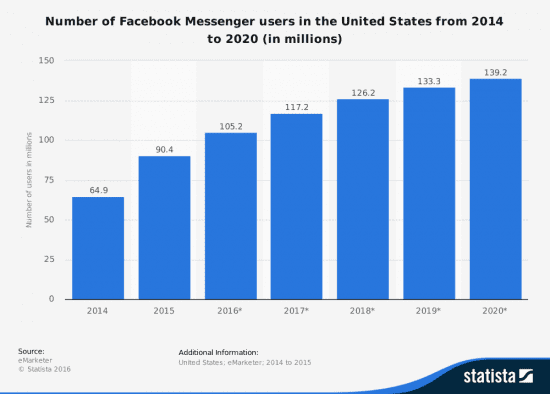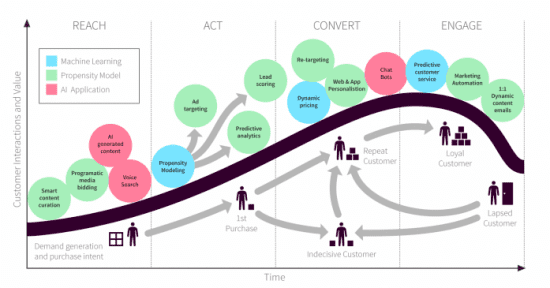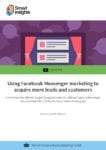Facebook messenger hasn’t been around for that long but it has definitely made an impression. With 1.2 billion active users, ⅙ of the global population is using this app!
Messaging apps have become extremely popular overtime, with a lot of the younger generation spending more time socialising through text messages, than face-to-face conversations. There are many different platforms, vying for users, in the messaging app ecosystem. In the battlefield of messaging apps, Facebook Messenger even leads Whatsapp for memberships, while WeChat is dominant in China, with over 90% using the app.
Even though geographic locations play a role in determining the popularity of messaging apps, the rise in usage of Facebook Messenger remains undeterred, with 1.2 billion active users that make ⅙ of the global population. 88% of online adults are a member of at least one of Facebook’s four main services: Facebook, Facebook Messenger, Instagram or WhatsApp.

For business, the Messenger app is roughly 3 years old. At the 2015 F8 conference, Facebook unveiled this new Messenger feature to improve the way in which business communicate to its customers. It’s taken a while to proposition Facebook Messenger as an app for businesses to utilize in their sales and marketing process, however, since 2015 more than 1 billion messages have been sent each month between customers and businesses. So, it’s definitely getting somewhere!
This graph from Statista shows the upward growth in the number of Facebook Messenger users in U.S., from 2014 onwards, and predicts further growth till 2020. In 2014, 64.9 million U.S. mobile phone users accessed the messaging app to communicate and this figure is projected to grow to 139.2 million users in 2020.

With a range of research showing the upward growth in the usage of messenger apps, such as Facebook Messenger, it’s time to ask the question. How can brands use it for their business?
There are numerous ways that brands can leverage this channel:
- Storytelling – create interactive stories and content to engage your prospects
- Customer Support – provide answers to common questions
- Sell – suggest a customised solution or suggestion through ads
- Transactional – use it to send transactional messages, such as purchase or shipping confirmations.
- Digest – regular newsletters or digest for your latest blog post and updates.
- Lead magnets – deliver evergreen lead magnets, where consumption rate is significantly higher
- Reminders – before webinars, workshops or live events.
- Awareness – help prospects understand what you do and how you can help
You can learn more about how to leverage Facebook Messenger to improve you brand's performance from our Quick Win on Facebook Messenger Marketing.
Not just a communication channel but a conversational channel
Every month 1.2 billion people are actively using Facebook Messenger to communicate with family, friends and acquaintances. More people are actively using Messenger apps than they are even using the social media networks like Twitter, Facebook and Instagram.
People also exchange one billion messages with businesses on Messenger every month. For some, it’s become a primary communication channel. But we cannot forget that it is first a conversational platform. Brands need to maintain that conversational aspect because that’s the nature of the platform.
According to a report on conversational commerce, the average conversation rates in stores range from around 20-30%, whereas online, that rate drops down to sub 10% depending on the brand strength. The obvious reasons for that could be the rich, visual and tangible experience that customers get when they physically visit a store. However, another reason is the instant customer support and service that they receive within the stores, making it essential for online platforms to be able to compete with that level of customer service.
Brands need to be able to provide more personalised, real-time customer experience. The report also reiterates that 53% of consumers are more likely to shop with a business they can message, making it worthwhile for business to consider deploying newer, more innovative martech such as chatbots and conversational UIs.
Millennials seem to be the quickest adaptors of chatbot-based customer experiences. According to Huffingtonpost, 60% of the millennial population already uses chatbots and 71% have implied that they would like to try using one. In fact, chatbots installed on messenger apps, such a Facebook Messenger, will see a stark rise in usage, over the course of 2018. Business can use messenger-based chatbots as more cost-effective way, to send customers personalised content, offer exclusive deals and suggest purchases.

Artificial Intelligence has been a hot topic in marketing, throughout 2017, but AI is a broad term covering a wide range of different technologies. Artificial intelligence means any technology that seeks to mimic human intelligence, which covers a huge range of capabilities such as chatbots, voice and image recognition etc. Smart Insights uncovers each different AI application and its implications for marketers in a detailed article about Applications of Artificial Intelligence.








